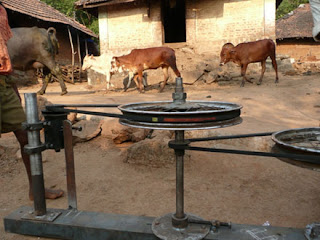I don't pretend to know a huge amount about the current
food crisis (see previous post
'Sheltered from a Crisis') and what's caused it but some of the things I do know have made me really angry about the way the world works. Below I've laid out some of the reasons, as I understand them, for the current food crisis. Reading them you'll understand - if you don't already - why some of these things make me so frustrated and angry, and ultimately I know make God angry.
Why is there a food crisis?
The current crisis is the result of a massive increase in the price of grain and a shortage of supply, both of which have fed into each other to create a rapidly escalating worldwide food crisis which is driving 'the bottom billion' further into poverty and starvation (UN). There have been a number of long-term factors leading to rising worldwide food prices over the last few years. More recently the massive price increases (especially in wheat and rice) have been caused by drought and investors hoarding supplies, triggering worldwide panic-buying, which in turn has pushed grain prices to their current heights.
Long and Medium-term factors:Increased demand for food worldwide.Economic growth in China and India has lead to a significant rise in meat consumption (closer to a Western-style diet). Meat production requires 4-10 times as much grain to produce the same amount of food. [This has been happening for a while and
no one quite agrees about
how importanta factor it is in this current crisis.]
Biofuel productionFood crops, especially corn and soya are being diverted to biofuel production. This year a third of America's (highly subsidised) corn crop will go to the biofuel industry. The Bush administration has pushed the development of corn-ethanol as a domestically-available alternative to petrol (the US enthusiasm for biofuel isn't about saving the
planet but rather saving
America. Biofuel isn't seen as an environmental -or even economic- answer to the fossil fuels question, but ultimately as the answer to the always-pressing national security issue of oil availability and cost). The UN estimates that the diversion of corn to biofuels has already contributed 10% to the current rise in food prices, while the IMF estimates it at 20-30% (
FT).*
The end of cheap food?US and European farm subsidies have long kept the price of commodities such as wheat and soya artificially low. For example, between 1995 and 2005 American taxpayers supported US agriculture by $165bn, most of which went to the huge US-based trading giants such as Cargill and ADM (
The Guardian). Low prices have led to under-investment in agriculture elsewhere, something which the rise in prices may actually help to remedy in time.
The price of oilThe increase in the price of oil (it has doubled in the past year) has lead to a steep rise in the price of fertiliser, (assisted by increased demand from the US biofuel industry). Transport prices have also increased. These have increased the cost of growing and transporting crops.
Medium to Short-term factors:Extreme weather conditionsSevere drought in Australia over the last few years has significantly decreased their wheat and rice production (
National Geographic).
Artificial shortages due to stockpiling and export restrictions.With prices climbing, there's plenty of incentive for those at every point of the food production chain to stockpile commodities, from traders to store-owners. Investors seeking a profit have driven up prices further by buying up the market for future sale. In recent months rice-producing countries have also responded to the rise in food prices by taking steps to protect their own markets. India and Vietnam, the world's second and third largest rice producers, have introduced export restrictions. This stockpiling by producers as well as middlemen has limited supplies of rice and driven up prices still higher (
Business Week).
Financial speculation on food prices.Rising commodities prices (and a slow-down in other markets) has dramatically increased the appeal of food futures to speculators. Speculators buy and sell stocks or commodities in order to benefit from fluctuations in price (without any interest in the product itself). Food futures contracts are agreements to buy or sell a given amount of food by a certain future date at a predetermined price. In trading futures speculators are gambling on the future price of food - i.e. that these will continue to rise. The speculators argue they are not driving the market, but cannot deny that the rising demand for commodities futures has amplified the price increases. In the past five years, the number of futures contracts for wheat has quadrupled (
foreignpolicy.com).
So is this worldwide food crisis why my weekly shopping bill has increased so much?The surprising answer might actually be 'no, not really'.
Although shoppers in Western countries have seen significant increases in the price of bread, rice, dairy products, eggs and so on, these have not in any way reflected the real worldwide increase in the cost of food. The supermarkets would like us to thank them for this, claiming to have insulated consumers with reduced profit margins. This may be true to a small degree but it's worth remembering that the real reason we have seen such a small increase in prices in comparison to world food prices is because such a small proportion of the price we pay for our food actually goes to pay for the ingredients. For example, if a loaf of bread costs £1 and 10p of that goes to pay for the flour, then a doubling in the price of flour will cause only a 10% rise in the price of bread (to £1.10). In fact the European Commission has argued that the near-doubling of the price of wheat should have led to only a 3% rise in the price of bread (
FT) rather than the 10% we've seen (giving you an indication of the real proportion of the cost going on ingredients).
While they're certainly having an effect, supermarket food prices are affected surprisingly little by movements in food prices worldwide (although those buying direct from wholesalers, such as restaurants, are insulated much less. Indian restaurants have been hit particularly badly by the rising price of rice and subsequent shortages). In fact, the main factor currently driving up prices in Western supermarkets are increases in energy, labour and transport costs caused by the dramatic rise in the price of oil (which is also a major contributor to the worldwide crisis). And oil is not likely to get any cheaper. It looks like the days of cheap food are over - and no one knows quite what to do about it.**
* Corn-based ethanol is hugely controversial, even without taking the food considerations into account. Many have claimed that the energy required to grow and convert corn to ethanol is greater than the energy gained from the fuel (although it does reduce the consumption of oil overall). This
MIT study attempts to bring some balance to the discussion. However it seems likely that the rising price of corn and soya have affected more than the price of food. Some claim that the rise in prices has led to
increasing deforestation in places like the Amazon rainforest as farmers clear land for
growing soya beans.
**I should add 'except God'. So perhaps it's time these world leaders got praying...
 The article mentions one example of this type of 'choice environment' - an ingenious little gadget called the Wattson which displays the amount of electricity you are using through colours and numbers, thus encouraging users to reduce the amount they use.
The article mentions one example of this type of 'choice environment' - an ingenious little gadget called the Wattson which displays the amount of electricity you are using through colours and numbers, thus encouraging users to reduce the amount they use.


